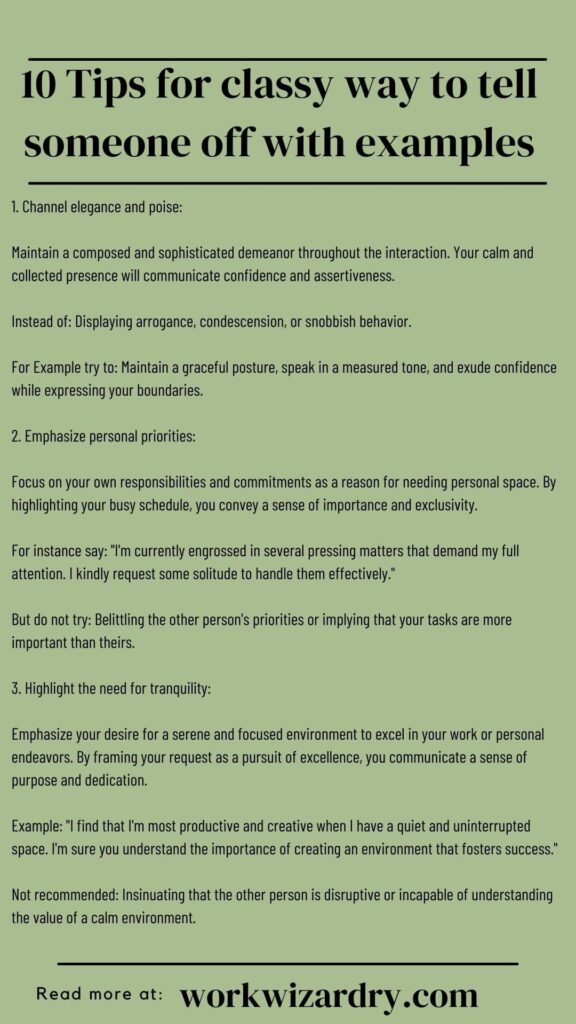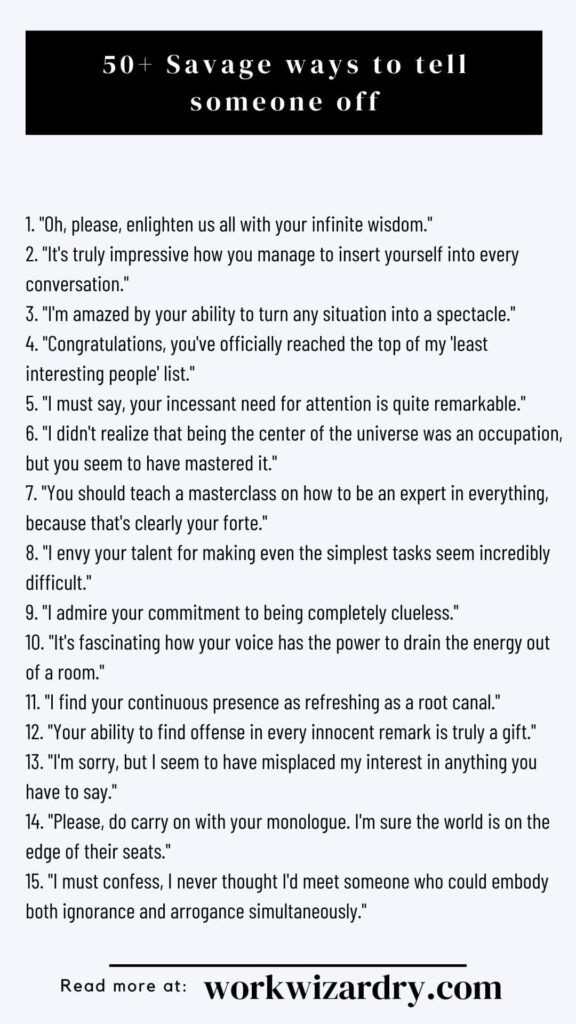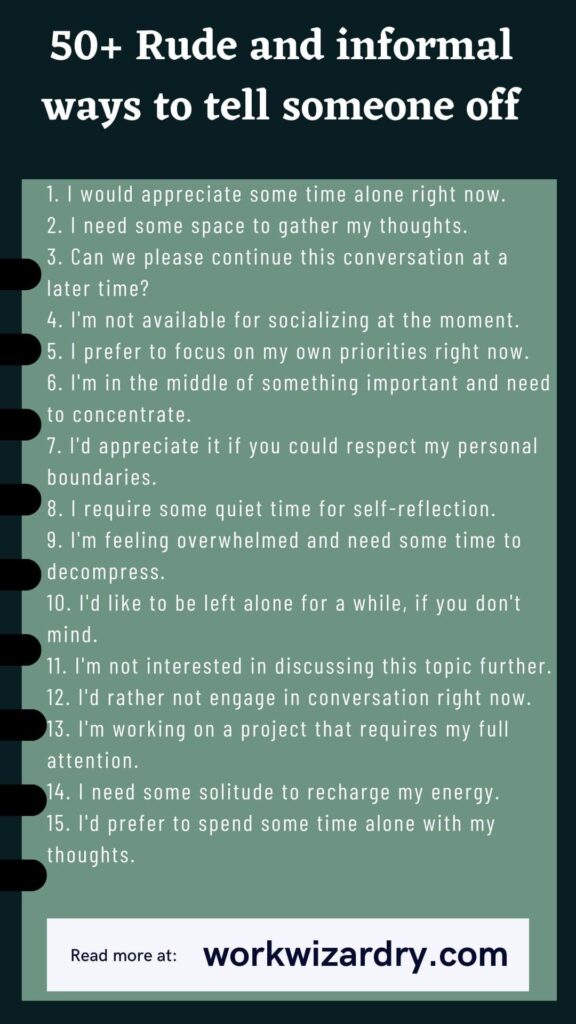In our interactions with others, we may occasionally encounter moments when we need to assert ourselves or address someone’s inappropriate behavior, but wish to do so with grace and class.
The ability to artfully navigate these situations can leave a lasting impression while maintaining dignity and respect.
This blog post aims to provide guidance on what is a classy way to tell someone off and master the art of eloquent confrontation.
We will explore effective tips, strategies, and real-life examples for various challenging scenarios.
By harnessing the power of tactful communication, you can assert yourself confidently while preserving relationships and fostering understanding.
Get ready to elevate your interpersonal skills and learn how to tell someone off with poise and sophistication.
Table of Contents

What is a Classy way to tell someone off?
I understand that you’re looking for a more sophisticated approach to assert your boundaries.
While it’s important to maintain a professional and respectful demeanor, it’s still recommended to prioritize open and direct communication.
However, if you’re seeking a classy, fancy and stylish way to convey your message, here are some tips for classy way to tell someone off with examples:
1. Channel elegance and poise:
Maintain a composed and sophisticated demeanor throughout the interaction. Your calm and collected presence will communicate confidence and assertiveness.
Instead of: Displaying arrogance, condescension, or snobbish behavior.
For Example try to: Maintain a graceful posture, speak in a measured tone, and exude confidence while expressing your boundaries.
2. Emphasize personal priorities:
Focus on your own responsibilities and commitments as a reason for needing personal space. By highlighting your busy schedule, you convey a sense of importance and exclusivity.
For instance say: “I’m currently engrossed in several pressing matters that demand my full attention. I kindly request some solitude to handle them effectively.”
But do not try: Belittling the other person’s priorities or implying that your tasks are more important than theirs.
3. Highlight the need for tranquility:
Emphasize your desire for a serene and focused environment to excel in your work or personal endeavors. By framing your request as a pursuit of excellence, you communicate a sense of purpose and dedication.
Example: “I find that I’m most productive and creative when I have a quiet and uninterrupted space. I’m sure you understand the importance of creating an environment that fosters success.”
Not recommended: Insinuating that the other person is disruptive or incapable of understanding the value of a calm environment.
4. Utilize diplomatic language:
Choose words and phrases that are diplomatic, yet assertive, to convey your desire for personal space. By using sophisticated language, you maintain a level of refinement in your communication.
For Example try saying: “I would greatly appreciate some solitude at the moment to indulge in introspection and contemplation. It’s during these moments that I can truly connect with my thoughts.”
Not recommended: Using pretentious or pompous language that may come across as condescending.
5. Express gratitude and redirect their attention:
Show gratitude for their interest or concern, while subtly redirecting their attention to other matters or individuals who might be better suited to assist them.
Instead of Belittling the person’s needs or implying that they are inconsequential.
Try for Example: “I’m genuinely grateful for your interest in engaging with me. However, I believe there’s someone else who possesses the specific expertise or knowledge to address your inquiries more effectively. Let me introduce you to [Name], who will be delighted to assist you.”
Also read: How to tell someone to go away politely? (125 Example phrases with professional communication tips)
6. Maintain elegance in non-verbal cues:
Accompany your sophisticated verbal communication with refined non-verbal cues. Use gentle hand gestures, maintain eye contact, and exhibit composed body language to further convey your message.
Example: Smile politely, nod graciously, and maintain a gentle yet firm posture while communicating your desire for personal space.
Not recommended: Displaying impatience, crossing your arms defensively, or rolling your eyes dismissively.
7. Utilize subtle redirection:
Redirect the conversation or subtly change the topic to gently steer the person away from further engagement or interaction with you. This approach allows you to maintain a sense of grace while shifting the focus.
Example: “That’s an interesting point you’ve raised. Have you considered discussing it with [Name]? I believe they would have valuable insights to offer on this subject.”
Not recommended: Blatantly ignoring or dismissing the person’s remarks without providing any redirection or alternative solution.
8. Employ tactful disengagement:
Gradually disengage from the conversation or interaction by expressing your need to attend to other matters or individuals. Doing so in a polite and diplomatic manner allows you to gracefully exit the situation while maintaining cordiality.
For Example: “It has been a pleasure speaking with you, but I have an appointment I must attend to. I’m sure we’ll have the opportunity to reconnect in the future.”
Not recommended: Abruptly cutting off the conversation or making excuses without providing a courteous explanation.
9. Assert boundaries with elegance:
Clearly and confidently express your boundaries while maintaining a sense of elegance and sophistication. Using a firm yet respectful tone, convey your need for personal space or time.
Example: “I value our connection, and I kindly request a bit of solitude to recharge and reflect. I believe it’s important to honor our individual journeys and allow for self-care.”
Not recommended: Using harsh or confrontational language that may be perceived as rude or offensive.
10. End on a positive note:
Conclude the conversation on a positive and uplifting tone, expressing appreciation for the person’s understanding and respect for your boundaries. This leaves a lasting impression of grace and consideration.
Example: “Thank you for respecting my need for personal space. I truly appreciate your understanding, and I look forward to reconnecting with you when the time is right.”
Not recommended: Ending the conversation with a dismissive or curt statement that may leave a negative impression.

100 Classy way to tell someone off
Here are some classy ways to tell someone off and leave you alone for different situations:
1. In a social setting:
- “I appreciate your interest, but I prefer to mingle and engage with other guests at the moment.”
- “Excuse me, there’s someone I’ve been meaning to catch up with. I hope you enjoy the rest of the event.”
2. During a work meeting:
- “I believe it’s best for everyone if we focus on the agenda and stay on track. Let’s save the side discussions for later.”
- “I understand your viewpoint, but I’d like to keep the conversation aligned with our main objective. Can we return to the topic at hand?”
3. Dealing with persistent interruptions:
- “I value your input, but I need some uninterrupted time to concentrate on this task. Perhaps we can discuss it later?”
- “I’m sorry, but I must prioritize my current responsibilities. I trust you can find a suitable solution or assistance elsewhere.”
4. When facing unwarranted criticism:
- “Thank you for sharing your thoughts, but I am confident in my approach and decisions. I prefer not to entertain further critique.”
- “I appreciate your perspective, but I am comfortable with my choices. Let’s focus on our respective paths without judgment.”
5. Handling intrusive personal questions:
- “I prefer to keep that aspect of my life private. Let’s shift the conversation to a different topic.”
- “I understand your curiosity, but I’m not comfortable discussing that particular matter. Can we explore a different subject?”
Also read: How to tell someone off using big words? (80 Examples with professional tips)
6. Dealing with excessive demands on your time:
- “I have a lot on my plate at the moment and need to prioritize my commitments. I hope you understand.”
- “I’m currently working on some pressing deadlines. I’ll be unable to assist you, but I’m confident you’ll find another solution.”
7. When faced with gossip or negative talk:
- “I believe in fostering a positive environment, so I prefer not to engage in gossip or negative discussions.”
- “I choose to focus on uplifting conversations. Let’s find something more positive to talk about.”
8. Handling persistent advances or romantic interest:
- “I appreciate your attention, but I’m not currently looking for a romantic connection. Let’s enjoy each other’s company as friends.”
- “I’m flattered by your interest, but I’m not available for a romantic relationship. I hope we can continue to interact as acquaintances.”
9. Dealing with excessive criticism or micromanagement:
- “I value your feedback, but I believe I have a good handle on this task. Trusting my judgment will allow me to perform at my best.”
- “I understand your desire for perfection, but I would appreciate some autonomy to complete this task according to my expertise.”
10. When facing unsolicited advice:
- “Thank you for your concern, but I prefer to approach this situation in my own way. Your support is appreciated, nonetheless.”
- “I’ve considered various perspectives, and I’ve chosen a path that aligns with my values and goals. I trust you can respect my decision.”
Also read: How to say f off without swearing? (100 Example phrases with tips for professional communication)
11. Dealing with excessive flattery:
- “I appreciate your kind words, but I prefer genuine connections that go beyond surface compliments. Let’s engage in more meaningful conversations.”
- “Thank you for your flattering remarks, but I believe in fostering authentic relationships based on substance rather than flattery.”
12. Handling invasive personal inquiries:
- “I’m afraid that’s not a topic I’m comfortable discussing. Let’s focus on something more neutral and enjoyable.”
- “I value my privacy and prefer not to delve into personal matters. Can we shift the conversation to a different subject?”
13. When faced with unsolicited suggestions:
- “I admire your enthusiasm, but I have a clear vision for this project. I would prefer to proceed with my original plan.”
- “I appreciate your input, but I’ve carefully considered my options and decided on the best course of action. Thank you for understanding.”
14. Dealing with a persistent social invitation:
- “I’m grateful for your continued invitations, but my schedule is currently quite full. I’ll reach out to you when I have more availability.”
- “Thank you for thinking of me, but I must decline this time. I hope you have a wonderful event.”
15. When facing boundary violations:
- “I believe it’s important to respect each other’s personal space. Let’s maintain appropriate boundaries to ensure a harmonious environment.”
- “I kindly request that you refrain from intruding on my personal space. Respecting each other’s boundaries is crucial for a healthy interaction.”
Remember, it’s essential to tailor your responses to each specific situation and individual.
These examples aim to maintain a classy and respectful tone while asserting your boundaries.
Prioritizing open and direct communication can help foster understanding and maintain positive relationships.

Savage ways to tell someone off
The following are some Fancy and Savage ways to tell someone off and leave you alone:
1. “Oh, please, enlighten us all with your infinite wisdom.”
2. “It’s truly impressive how you manage to insert yourself into every conversation.”
3. “I’m amazed by your ability to turn any situation into a spectacle.”
4. “Congratulations, you’ve officially reached the top of my ‘least interesting people’ list.”
5. “I must say, your incessant need for attention is quite remarkable.”
6. “I didn’t realize that being the center of the universe was an occupation, but you seem to have mastered it.”
7. “You should teach a masterclass on how to be an expert in everything, because that’s clearly your forte.”
8. “I envy your talent for making even the simplest tasks seem incredibly difficult.”
9. “I admire your commitment to being completely clueless.”
10. “It’s fascinating how your voice has the power to drain the energy out of a room.”
11. “I find your continuous presence as refreshing as a root canal.”
12. “Your ability to find offense in every innocent remark is truly a gift.”
13. “I’m sorry, but I seem to have misplaced my interest in anything you have to say.”
14. “Please, do carry on with your monologue. I’m sure the world is on the edge of their seats.”
15. “I must confess, I never thought I’d meet someone who could embody both ignorance and arrogance simultaneously.”
Also read: How to professionally say don’t waste my time? (120+ Examples with professional communication tips)
16. “Your knack for exaggeration is truly awe-inspiring. I can’t help but be in awe of it.”
17. “I’m sure your perspective is fascinating, but I have an appointment with someone who actually matters.”
18. “You have a unique talent for making any gathering significantly less enjoyable.”
19. “I can’t help but wonder if you ever get tired of hearing yourself talk.”
20. “Your presence alone is a constant reminder that silence truly is golden.”
21. “I didn’t realize that a conversation with you was an opportunity to receive unsolicited advice. Silly me.”
22. “Your opinions are like the weather forecast – constantly changing and largely unreliable.”
23. “I must admit, I’m impressed by your dedication to being consistently self-absorbed.”
24. “I’m sorry if my lack of enthusiasm for your company isn’t what you expected.”
25. “If only your achievements matched your ability to make everything about yourself.”
26. “I hope you find as much joy in your own company as you seem to find in imposing it on others.”
27. “It’s remarkable how you can speak for hours and still say absolutely nothing of substance.”
28. “I apologize if my facial expression doesn’t quite match the excitement I should feel in your presence.”
29. “I’m sure there’s someone out there who appreciates your particular brand of charm. Unfortunately, it’s not me.”
30. “Your incessant need for validation is truly something to behold. Best of luck with that.”
Also read: How to politely tell someone to shut up? (135 Examples with professional tips)

Informal and rude ways to tell someone off
Here are some informal and rude ways to tell someone off:
1. I would appreciate some time alone right now.
2. I need some space to gather my thoughts.
3. Can we please continue this conversation at a later time?
4. I’m not available for socializing at the moment.
5. I prefer to focus on my own priorities right now.
6. I’m in the middle of something important and need to concentrate.
7. I’d appreciate it if you could respect my personal boundaries.
8. I require some quiet time for self-reflection.
9. I’m feeling overwhelmed and need some time to decompress.
10. I’d like to be left alone for a while, if you don’t mind.
11. I’m not interested in discussing this topic further.
12. I’d rather not engage in conversation right now.
13. I’m working on a project that requires my full attention.
14. I need some solitude to recharge my energy.
15. I’d prefer to spend some time alone with my thoughts.
Also read: How to tell someone off in a professional way? (125 Example phrases for different situations)
16. I value my privacy and would appreciate it if you could respect that.
17. I’m not up for socializing at the moment, but I appreciate your understanding.
18. I’m not in the mood for company right now.
19. I would like some quiet time to relax and unwind.
20. I’m taking a break from social interactions for the time being.
21. I prefer to handle this matter on my own.
22. I’m feeling a bit overwhelmed and need some personal space.
23. I need some time to myself to clear my mind.
24. I’m not available for socializing at this particular moment.
25. I’m currently in a state of introspection and would appreciate some solitude.
26. I’d rather not engage in any discussions or debates at the moment.
27. I’m taking a break from social engagements for personal reasons.
28. I prefer to be alone with my thoughts right now.
29. I would appreciate it if you could give me some space to breathe.
30. I need some peace and quiet to destress.
Also read: How to professionally say go to hell? (75+ Examples and tips)





